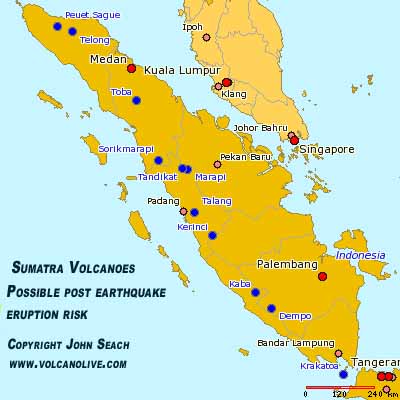
John Search has been monitoring volcanic activity in this region for sometime now, and I am not sure if he is the source of the story below, but it seems likely;
(Note: this is an email that was sent to me)
> > BENCANA LEBIH DAHSYAT MENANTI
> > Pakar: Jangkakan letupan gunung berapi
> >
> > SYDNEY - Seorang pakar Australia semalam memberi amaran tentang prospek
> > berlakunya letupan gunung berapi besar di Indonesia yang bakal
> > meninggalkan kemusnahan lebih buruk berbanding bencana lain yang telah
> > dialami sebelum ini.
> >
> > Profesor Ray Cas daripada Jabatan Geosains Universiti Monash berkata
> > gunung berapi terbesar dunia ialah Danau Toba di Sumatera. Danau itu
> > terletak di garis gelinciran yang merentasi bahagian tengah Sumatera.
> >
> > Profesor Ray Cas dari Fakulti Geosains Universiti Monash berkata gunung
> > berapi super volcano terbesar di dunia itu terletak di Tasik Toba, di
> > Sumatera,Indonesia. Letupan gunung berapi itu kemungkinan berlaku dalam
> > waktu terdekat dan di percayai Malaysia juga bakal menghadapi kesannya
> > apabila di jangka beberapa kawasan bakal bergegar kuat,air laut bakal
> > melimpah,tanah mendap dengan keluasan yang besar dan
> > letusan gunung berapi itu juga di jangka bakal menggegarkan menara 'KLCC'
> > hingga membuatkan ianya bergoyang kuat.
> >
> > Sebelum ini, pakar seismologi meramalkan gempa bumi ketiga berlaku di
> > garis gelinciran itu selepas gempa bumi sekuat 9.0 pada Skala Richter
> > Disember lalu dan gempa 8.7 pada Skala Richter Isnin lalu. Menurut beliau,
> > gempa bumi yang berlaku di garis gelinciran itu akan mempercepatkan satu
> > letupan gunung berapi.
> >
> > Profesor Cas berkata kali terakhir danau itu meletup ialah sekitar
> > 73,000 tahun lalu dan telah mengubah iklim dunia.Beliau menarik perhatian
> > kadar korban ekoran letupan gunung berapi besar 'boleh mencapai beratus
> > ribu sehingga jutaan' orang.'Masalah besarnya ialah banyak gunung berapi
> > berpotensi meletup, tetapi tidak diawasi dengan sepatutnya,' jelas beliau.
> >
> >
> > Sementara itu, Agensi Kaji Cuaca Jepun berkata hanya Singapura dan Sri
> > Lanka memohon untuk menerima amaran awal tsunami daripada Jepun. Selain 11
> > negara yang dilanda tsunami pada 26 Disember lalu, Jepun telah menawarkan
> > amaran awal tsunami di rantau lain termasuk Australia, Britain, Mesir,
> > Perancis dan Afrika Selatan.
> >
> > Para pegawai berkata negara lain mungkin mendapatkan amaran awal daripada
> > Pusat Amaran Tsunami Pasifik yang
> > berpangkalan di Hawaii. - AFP.
Now, I looked up John Search's website , and it was a shocking reality that hit me of the dangerous times in which we live in.
On one hand, we think of the urgency of evangelism that grabs us in these times, but there is another aspect to consider, the fact that we have a human responsibility to stop abusing this planet, and there are consequences for our greed.
Check out this article by Dr. Paul Brand:
A Handful of Mud
Soil is life. Can we preserve it for future generations?
By Paul Brand | posted 07/10/2003
I grew up in the mountains of South India. My parents were missionaries to the tribal people of the hills, and our lives were about as simple as they could be—and as happy.
There were no roads. (We never saw a wheeled vehicle except on our annual visit to the plains.) There were no stores, no electricity, no plumbing. My sister and I ran barefoot, and we made our own games from the trees, sticks, and stones around us. Our playmates were the Indian boys and girls, and our lives were much the same as theirs.
Rice was an important food for all of us. And since there was no level ground for wet cultivation, it was grown all along the streams that ran down the land's gentle slopes. These slopes had been patiently terraced hundreds of years before; and now every one was perfectly level, and bordered at its lower margin by an earthen dam covered by grass. Each narrow dam served as a footpath across the line of terraces, with a level field of mud and water six inches below its upper edge and another level terrace two feet below. There were no steep or high drop-offs, so there was little danger of collapse.
Those rice paddies were a rich soup of life. When there was plenty of water there would be a lot of frogs and little fish. Egrets would stalk through the paddy fields on their long legs and enjoy the feast. Kingfishers would swoop down with a flash of color and carry off a fish from under the beak of a heron.
And it was here I learned my first lesson on conservation.
Read the full article
















1 comment:
site here why not try this out navigate to this web-site pop over to these guys visit Our site
Post a Comment